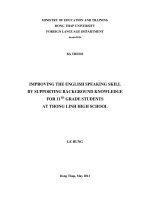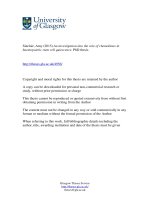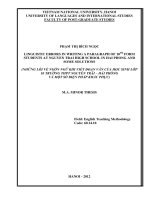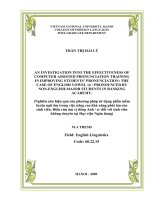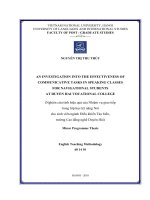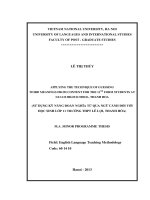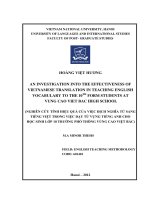An investigation into the effectiveness of using task-based method in teaching and learning reading for 11th form students at Nguyen Trai High school, HN
Bạn đang xem bản rút gọn của tài liệu. Xem và tải ngay bản đầy đủ của tài liệu tại đây (198.83 KB, 5 trang )
An investigation into the effectiveness of using
task-based method in teaching and learning
reading for 11th form students at Nguyen Trai
High school, Hanoi
Nguyễn Thị Dung
Trường Đại học Ngoại Ngữ
Luận văn ThS. Chuyên ngành: English Linguistics; Mã số: 60 22 15
Người hướng dẫn: M.A. Nguyễn Minh Huệ
Năm bảo vệ: 2010
.
Keywords: Tiếng Anh; Phương pháp dạy học; Kỹ năng đọc; Lớp 11
Content:
CHAPTER ONE: INTRODUCTION
1.1. Rationale
English is the most widely spoken language in the world and has more second-language
speakers than any other language. There is no doubt that the role of English in the world today
has been becoming more and more important. It is English that is used as an effective medium of
international communication. It is also the language of Internet, and so studying, doing research,
interacting with international companies and travelling are almost impossible without at least
some English. The widespread need for English as an international language puts a considerable
pressure on the education resources of any countries. In Vietnam, since the government carried
out the open door policy to attract foreign investment and co-operate with other countries,
teaching and learning English has become more necessary. That is the reason why learning
English is not only the interest but also the great and practical demand for many people,
especially for students who always want to assess the modern world. Therefore, English is now
taught as a compulsory subject to students at high schools in our country.
To learn English, students need to grasp all four skills that are closely related to one another:
Listening, Speaking, Reading and Writing. Among these skills, reading is an important one
because it does not only help students develop other language skills, but also provide them
knowledge on the target language. Reading is an important way of expanding the students’
receptive knowledge of the language and in terms of classroom activities, it is also an effective
way of stimulating students to talk and write. As we read, we go back to the time, pass across the
oceans and barriers of language, regions and cultures. Therefore, how to teach reading well and
effectively has been the concern of the teachers.
Through the time of using the “Tiếng Anh 11” to teach English at Nguyen Trai High School,
Hanoi, most of the students have faced problems in learning Reading skill. Also, the teachers
find hard to make the Reading lesson interesting. When they use Task-based language teaching
in Reading class, the teachers find the situation of teaching and learning Reading is better.
Moreover, after learning the M.A training course at University of Languages and International
Studies, Vietnam National University, Hanoi, I have studied about Task-based language teaching
and its applications in teaching English at schools. Therefore, I think it is essential to do a
research on the effect of teaching Reading for the 11
th
form students at my school by using the
Task-based language teaching to improve reading skill for the students. That is the reason why I
choose to investigate the effectiveness of using task-based method in teaching and learning
Reading for 11
th
form students at Nguyen Trai High School, Hanoi.
1.2. Aims and objectives of the study
This study aims at improving the quality of teaching/learning English reading as second
language in the upper secondary education for 11
th
form students through using Task-based
language teaching in Reading class.
To achieve this aim, the study sets out to obtain the following specific objectives:
1. To investigate the perceptions of the effectiveness of using of Task-based language
teaching in teaching and learning reading to 11
th
form students at Nguyen Trai High School in
Hanoi held by teachers and students;
2. To elicit teachers and students’ suggestions for improving students’ reading competence
through Task-based language teaching.
1.3. Research questions
In order to achieve the above- mentioned aim and objectives, the answers to the research
questions that are presented below should be found:
1. How does Task- based language teaching help the 11
th
form students improve their reading
skills as perceived by teachers?
2. How does Task- based language teaching help the 11
th
form students improve their reading
skills as perceived by students?
3. What are teachers and students’ suggestions for using Task-based language teaching to
improve students’ reading skills?
1.4. Scopes of the study
The study is concerned with investigating the effectiveness of using Task-based language
teaching in teaching and learning reading for the 11
th
form students at Nguyen Trai High School,
Hanoi. Other approaches to teaching reading intended for students at other levels of English
language proficiency or teaching other skills would be beyond the scope.
1.5. Organization of the study
This thesis consists of four chapters:
Chapter I, Introduction, presents the general background of the study, the aims, objectives,
the research questions, the scopes, the methodology and the organization of the study.
Chapter II, Literature Review, provides issues relating to Reading, Reading comprehension
and Task- based language teaching in Reading class.
Chapter III, Methodology, presents the research methodology employed and the rationale of
using qualitative and quantitative method for the achievement of the aim of the study.
Chapter IV, Results and Discussions, presents the results and discusses the study’s findings.
Chapter V, Conclusion, offers some implications for reading training from the findings; gives
limitations; provides recommendations and directions for future research.
References
Abbot et al. (1981), The teaching of English as an international language, Collins.
Brown, H. D. (1994), Teaching by principles: An interactive approach to language pedagogy,
Englewood Cliffs, New Jersey: Prentice Hall Regents.
Carell et al. (1988), Interactive Approaches to second language reading, Cambridge, CUP.
Dang, Thi Thu Thuy (2009), A study on using task-based method in teaching Listening for 10
th
form students at Tran Phu high school in Vinh Phuc, M.A. Thesis Linguistics, University
of Languages and International Studies, Vietnam National University, Hanoi.
Francois, J. (1981), Theoretical models and processes of reading, Neward Delaware:
International Reading Association.
Grellet, F. (1981), Developing Reading Skills, Cambridge, CUP.
Harmer, J. (1983), The practice of English language teaching: New Edition, London: Longman.
Harper, D. and July, H. (1982), Communicative language teaching, Singapore University Press.
Huang Jianru (2001) How to design tasks in task-based language teaching?, Singapore
University Press.
Johnson, K. (2001), An introduction to foreign language teaching and learning, London:
Longman.
Lewis, M. and Hill, J. (1985), Practical techniques for language teaching, London: Commercial
Color Press.
Long, M.H. (1985), Role for instruction in second language acquisition: task- based language
teaching in K. Hyltenstam and M. Pienemann (eds), Modeling and assessing second
language acquisition, Clevedon: Multilingual matters.
Nguyen , Thi Oanh (2005), The effects of using Task-based techniques in Teaching Reading for
12
th
form students at Nguyen Trai high school in Hai Phong, M.A. Thesis Linguistics,
University of Languages and International Studies, Vietnam National University, Hanoi.
Nguyen, Thi Hien Huong (2007), A study on the benefits of implementing a task-based approach
in teaching speaking to the third-year students of business administration Department,
Trade Union University, M.A. Thesis Linguistics, University of Languages and
International Studies, Vietnam National University, Hanoi.
Nunan, D. (1989), Designing tasks for the communicative classroom, Cambridge, CUP
Nuttal, C. (1982), Teaching reading skills in a foreign language, London, Heinemann
Educational Book.
Richard, J.C and Thomas, R. (1987), Being an effective reader, Harper and Row Publisher.
Rossman, G.B and Rallis, S.F (2003), Learning in the field: An introduction to the qualitative
research, Thousand Oaks, CA: Sage.
Skehan (1998), A cognitive approach to language learning, Oxford: Oxford university press.
William, E. (1984), Reading in the classroom, Macmillan Publisher.
Willis, J. (1996), A flexible framework for task-based learning, In: D. Willis. and J. Willis(eds),
Challenge and change in language teaching, Oxford.
Willis, J. (1998), A frame work for task-based learning, London: Longman.


